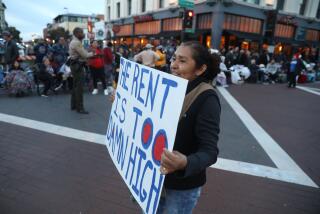Statistical Sophistry and Real Poverty
Incredible! A member of The Times Board of Economists, Michael J. Boskin, writes that the poor have improved their status under Ronald Reagan (“Most Have Profited Under Reagan,” May 19).
Boskin bolsters this fantastic assertion with statistics that purport to show that President Reagan’s “social” programs actually have increased benefits to the poverty-stricken.
I don’t know what sand dune he’s been hiding his head in the past few years, but I suggest that Boskin come up for air and examine the true reality of the poor. In 1985, 33.1 million persons were impoverished.
At that time, fully one out of three blacks had no appreciable assets (savings, stocks, bonds, pensions, etc.) to rely on.
In 1979, one out of five families with children were aided by Social Security, unemployment insurance or public assistance.
By 1985, the number had dropped to one out of nine families. All of these programs for the needy were slashed, not bolstered, as Boskin implies, by Reagan.
The economic plight of the poor can easily be measured by other gauges as well.
The number of homeless on our streets has risen, more children go to bed without adequate nutrition and crime has escalated to epidemic proportions.
Even the much-cherished drop in unemployment is more illusion than fact.
Discouraged workers, part-time workers, temporary workers and many thousands more who would take full-time jobs if available are routinely excluded from the Bureau of Labor Statistics’ monthly job count.
The thousands of new jobs are primarily in the service industries.
They are mostly low-pay, unskilled or semi-skilled positions.
They are hardly an adequate substitute for the loss of the skilled, high-paying jobs in the auto, steel, mining, plastics and rubber industries.
Workers in these industries have suffered as company after company has moved operations to Third World countries to take advantage of cheap labor and low taxes.
Boskin, and other apologists for the economic misery that Reagan has wrought on the poor, must realize that no amount of statistical sophistry can substitute for decent jobs, housing and income--none of which has been created by the Reagan Administration.
EARL HUTCHINSON
Inglewood
More to Read
Get the L.A. Times Politics newsletter
Deeply reported insights into legislation, politics and policy from Sacramento, Washington and beyond. In your inbox three times per week.
You may occasionally receive promotional content from the Los Angeles Times.










